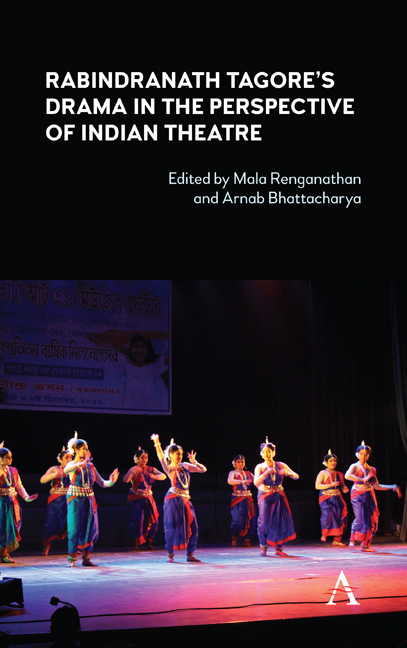Chapter 3 - Place and Space in Tagore’s Raktakarabi and Muktadhara
Published online by Cambridge University Press: 20 January 2022
Summary
The plays of Rabindranath Tagore have been mostly conceived as elusive, philosophical and hence more impressive as closet plays than theatrical performances. One of the reasons could be the way Tagore manipulates place and space in the plays to create complex visual and ideological registers that make enactment a challenging endeavour. I shall submit two plays to critical exploration – Raktakarabi and Muktadhara – to underscore how Rabindranath uses various places and spaces as tools for his radical and often subversive ideas. It would also be interesting to note how various places/locales are spatially interpreted and how the place/space binary is often dissolved to produce a vision of sublime grandeur or ‘immensity’, to borrow the term from Gaston Bachelard. The plays are amenable to a post-structuralist understanding of spatiality as an indispensable component of social existence and offer profound insights into the themes that Tagore repeatedly evokes in his plays –human greed, power, justice, the value of common human experience and freedom. The plays under examination are characterized by various demarcations between the external spaces which may be interpreted as spaces of power, freedom, mechanization, avarice, democratic values, of quotidian existence and humane virtues. In fact, the constitutive principle of space perception is the relations between locations in space. This encourages a study of the relations between various places and spaces in Tagore's plays and an understanding of the inherently spatial constitution of social relations.
Tagore's radical experiments in drama distinguished his plays from the colonial Bengali theatre and established a tradition that is distinctly Tagorean. By placing him in the context of the Bengali theatre of his time we would acquire a better understanding of how the manipulation of the place-space dichotomy had radicalized contemporary theatrical conventions in Tagore's plays and strengthened the thematic and ideological imports of his drama. The Bengal ‘Renaissance’, impacting the cognitive and cultural life between 1795 to the last quarter of the nineteenth century, was much more than an enthusiastic assimilation of Western culture into native culture. It was prompted by the desire to search for a cultural identity and escape the ignominy of colonial subjugation.
- Type
- Chapter
- Information
- Publisher: Anthem PressPrint publication year: 2020



